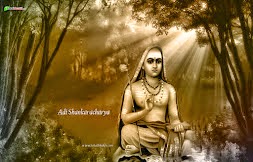Swami Adi Sankaracharya's Philosophy of Life : 1.

Man does not live by bread alone; he lives by the Spirit within. Spiritual hunger continues even if this physical body is cast off. Unless this innate hunger for knowledge and perfection is appeased, one cannot hope to have any rest. The saints, sages and Avataras purvey to man, now and then, the required spiritual food. Sankara is one such great feeder of mankind. It was Sankara who finally and satisfactorily answered the perplexing questions of life – questions concerning the inward, the outward, the above, and their mutual relations, questions which embrace the entire existence itself in their scope. There is the seer, the seen and also something which cannot be either the seer or the seen, as corroborated by a necessity felt for a reality which must be other than the individual who is the seer and the world which is the seen, both of which are known to be appearances due to their inherent character of changing, passing away, and giving rise to something else. Man


.jpg)
.jpg)
.jpg)

